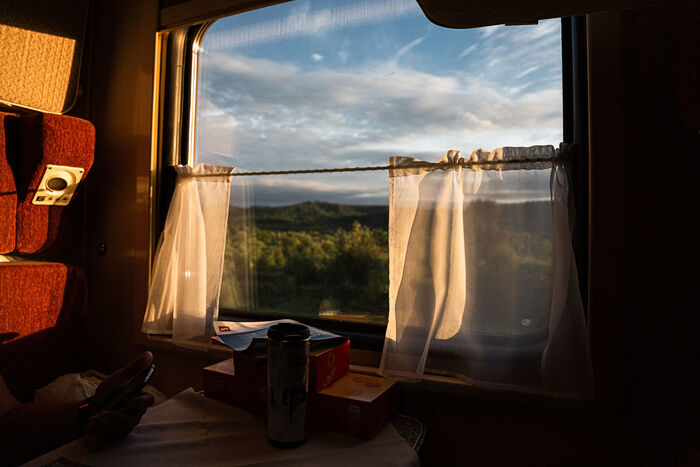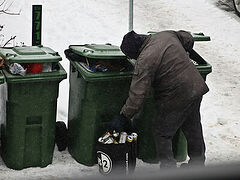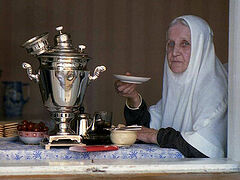There is always room for a smile in the complex life of the Church. Sometimes, even serious people, like aged archpastors and young border guards, give us a reason to smile. Today’s story is about one such instance as shared by Fr. Oleg Vrona, rector of the St. Nicholas Church in Tallinn, Estonia.
It happened in the ‘nineties—times remembered by Estonians for the introduction of the property restitution law. Half of the Estonian population was rejoicing that justice was finally being served and they could reclaim the property owned by their families before 1945, while the other half of the Estonian population was forced to give up their apartments and homes to the lawful former owners, having no idea where they were now going to live. The parishes of the Estonian Orthodox Church of the Moscow Patriarchate, forced to give up their property rights to the parishes of the Constantinople Patriarchate in compliance with the new law, found themselves in the same position. To be honest, our parishes were in no hurry to part with the properties they considered their own, because when Estonia was part of the Russian Empire, these were the parishes that had built those churches and purchased all necessary accoutrements. Due to their unyielding stand, representatives of the Estonian Republic and both Patriarchates began negotiations in search of compromise.
The negotiations were held alternately in Tallinn, Moscow, and the Phanar, the residence of Patriarch of Constantinople, or even in Switzerland. It so happened that one day the representatives of our Estonian Orthodox Church of the Moscow Patriarchate headed by Metropolitan Kornily (Jacobs) were also invited to Moscow to participate in the three-party negotiations. Onboard the Tallinn-Moscow sleeper train, our five-person delegation had reserved two adjacent compartments, but in fact Vladyka immediately invited everyone to come to his compartment and continue discussions about the upcoming negotiations. Time went by quickly and we didn’t notice how our train arrived at the border. It was late autumn, and already dark outside. We knew that the Metropolitan preferred to go to bed early, so there were no objections when he suggested that we begin reading the evening prayer rule. I realized it wasn’t such a good idea to start reading a prayer rule while crossing the borders, since in all likelihood, the border patrol and customs officers wouldn’t let us pray in peace; I nevertheless refrained from voicing my concerns and kept my doubts to myself. Just before we crossed the newly established border between the two countries, our conductor came to collect our passports, and casting another curious glance at our beards and identical black cassocks, he was off.
We settled into Vladyka’s compartment in the following manner: Metropolitan Kornily on the lower berth to the left of the window, three of us seated on the opposite berth, and one of us, the “assigned reader,” as he would be called according to the church Typikon, armed with the prayer book, stood facing the window next to the table topped with a small icon triptych.
Vladyka Kornily was lying on his back with eyes closed and hands crossed over his chest, his ample grey beard resting upon them, and it was difficult to tell whether he had dozed off from the fatigue of a busy day or was simply immersed in deep prayer. Meanwhile the sound of spoons clinking against tea glasses in nearby compartments died away, and the only noise heard was the occasional crying of a fussy child. It seemed as if the whole carriage was curiously attuned to the life inside the mysterious “chapel compartment” and inadvertently took notice of the prayers that might have awakened in some sensitive souls thoughts of eternity long forgotten amidst the bustle of everyday life.
At the Russian border, when we were almost done with our prayer rule, we heard some firm steps coming towards us through the corridor. Someone’s commanding hand pulled the handle of our half-closed door in an attempt to open it wide. The next moment the stately figure of a young Russian border guard appeared in the doorway, and then instantly grimaced as if he were about to throw up. “A corpse!” he muttered to someone beside him, then quickly slammed the door shut.
We observed with our own eyes the life-giving effect of our proximity to Mother Russia: As soon the door closed with a bang, our “corpse” shuddered, opened his eyes, and said with the voice of a well-rested man: “Are we in Russia already?” “Yes, we are, Vladyka,” the four of us replied with one voice, barely able to hold back our laughter.
It was quite hard to stay serious. The border guard must surely have thought we were reading a funeral service for our drowsy metropolitan whom he thought was dead. He probably decided that it was beyond him to pick up a dead body and check for any illegal stowaways in the storage bin beneath him, and it would be best to skip the inspection of our unfortunate compartment altogether. Obviously, our “corpse” made such a strong and lasting impression on everyone else at the Russian border that we had no further inspections whatsoever.
I was greatly amused by the incident and mused that if “the corpse” prevented the border guard and customs officers from conducting their usual inspection in our compartment, some resourceful smugglers could probably use the same ploy as well and get away with it. However, I decided to keep these thoughts to myself. Suppressing a fit of laughter, I successfully disposed myself to the same serious frame of mind I had during the reading of the evening prayer rule, and silently recited a few more evening prayers. Soon, as my thoughts turned to the topic of our negotiations and the upcoming solemn meeting with Patriarch Alexiy, I involuntarily recalled the episode with the border guard—but this time it evoked only a smile instead of laughter.




